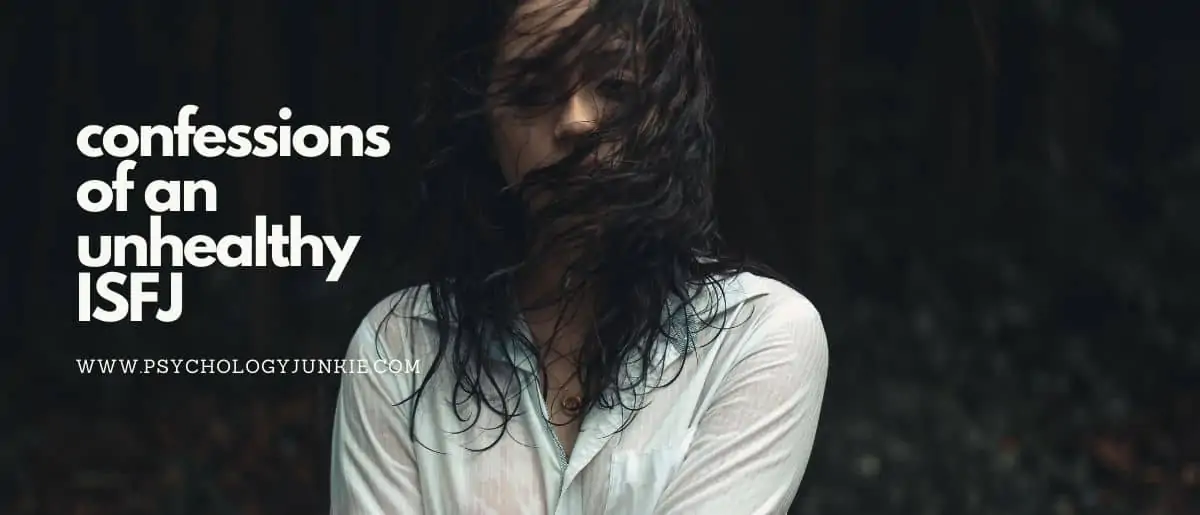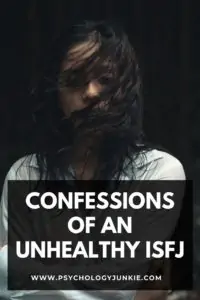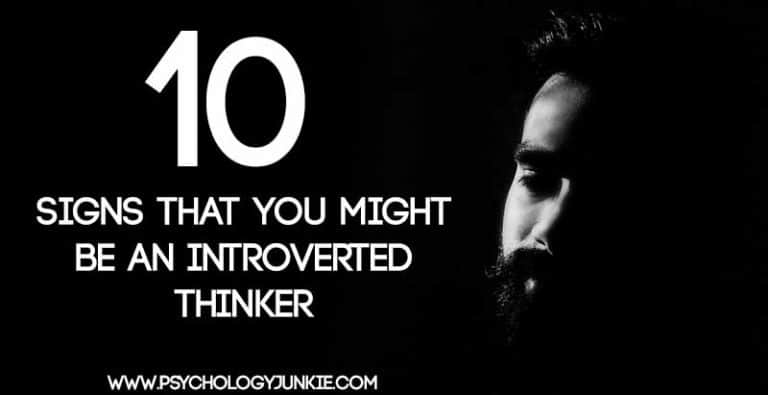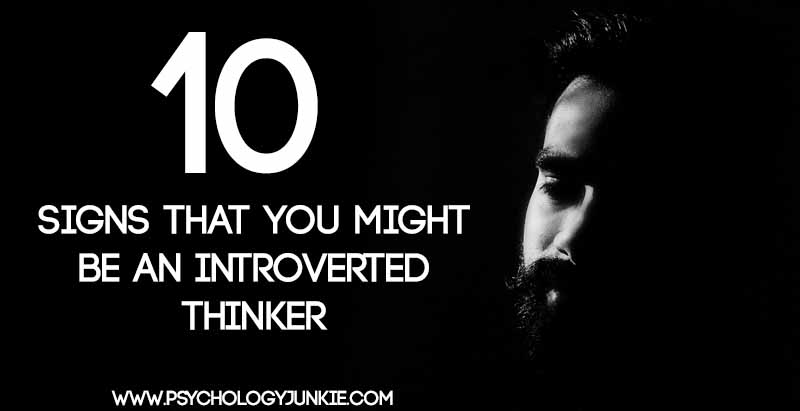Confessions of an Unhealthy ISFJ
It’s fair to say that I am coming out of (and thus am still in) an unhealthy ISFJ state, which provides me the perfect opportunity to exploit myself in order to articulate from that space. I cannot say how long I’ve been in the depths of it. Years, potentially. I have lived alarmingly unaware years, which exacerbates the venomous swirls underneath what is visible to the eye. Regardless, I hope this account provides some awareness around what it’s like for an ISFJ to wear a mask in order for everyone else to be happy. The mask does not deserve praise as it creates a toxic, illusionary reality that substantially hurts both viewer and performer. Self-suppression not only poisons the ISFJ, but everything they touch.
Table of contents
Estimated reading time: 23 minutes

The Many Shades of Being an Unhealthy ISFJ
At the crux of an ISFJ’s evolution is an awareness that something inside of themselves actually matters more than their continual sacrifice for other people (who never asked for nor desired it). While holding space for oneself is an obvious reality for some types, it’s a shocking realization for someone supposedly “built” to cater to other people. Unhealthy ISFJs nearly believe they are biologically constructed to accommodate. They do not listen to or respect themselves. When in this state, only something sustainably jarring can turn the kaleidoscope of perception just enough so that the ISFJ can witness the dissonance between their reality and their desires. In short, a catalyst for change is needed. Something so viable it inspires the ISFJ to come back to themselves. The catalyst is varied and could arrive at your door in the form of a number of nouns. Mine came in the form of a person with a book who remained in my presence just long enough to sever the ties of my old worldview.
I could go on about the breaking point, the dissipation of the catalyst, and my subsequent awakening, however, I am most concerned with who unhealthy ISFJs are, how they show up, and how they become toxic in the first place. I wish to pick apart the unawareness of the unaware.
Why do we pick up the mask?
I am an enormous fan of V for Vendetta. The story follows a masked protagonist name “V,” whom Natalie Portman claims is “a good man who does bad things.” A lovely sentence for a complex man. (A description most of us likely share, if we really examined ourselves.) Over the course of the story, V kills several people associated with the government in order to claim his revenge, all the while working to distill the truth of the corrupt government to the general populous. He ultimately encourages “the people” to take back their autonomy, freedom of speech, etc.
As submissive as I tend to be, V’s call for revolution still enticed me. The man himself moved me as well. Who was this person, causing such collective havoc and revelation? I wanted to know. Yet V never removed his mask. V proclaimed that it didn’t matter who he specifically was, what mattered was the idea, because ideas are bulletproof. I was charged off that statement, and continue to be, however, I believe the man behind the mask matters. Greatly.
How can someone fight to grant truth and freedom to a nation of people without first wanting it for themself?
They can’t.
How can an ISFJ fight to provide a nurturing space where everyone is heard and considered without first wanting to be heard and considered themselves?
They can’t.
Over time we tend to learn that laws are instated to rectify problems—if stealing never occurred, we would never need a law against it. Laws tell us that something has become a big enough problem for others to notice and worry over. The repeated action necessitates the law.
If an ISFJ cultivates a space where everyone is allowed to be heard, as they have always wanted to be heard (to rectify the unheard moments), it becomes a part of their duty to provide that space. It becomes law. The law, as is, works smoothly. Until it doesn’t. There are always events we cannot anticipate. Thus, if an ISFJ comes to recognize that their own opinion could sway another person from their own ability to safely express, then that ISFJ reverts to the law. When “everyone” is deconstructed, “everyone else” is bigger than “me.” Majority rules. The law is amended. The ISFJ learns to nod quietly and remain silent so that the other speaker remains free. So says the unhealthy ISFJ.
The unhealthy ISFJ soon becomes a smiling wall that others can bounce their thoughts off of. But what’s underneath? What thorns knot themselves around an ISFJ’s throat when they can no longer speak their own truth? Who are they damaging because of this? What are the consequences?
Who really is V?
I like the concept of drowning as it evokes a passionate fight for oneself. If I just beat the current, I could live. I wasn’t drowning when I became a mask. Yet I am now.
Potentially, this account will prove helpful to other ISFJs caught in the endeavor of struggling towards health.
Certainly, this curtain call might be a bit over the top, but us toxic people like a little drama, don’t we?
1 – Caught Up in the Past (Si-Ti)
The functions of any type can generally set people into negative whirlwinds that devour substantial time and energy. For ISFJs, Si grants them an intimate partnership with specific moments in the past. Usually, these moments connect to what has previously occurred with specific people (friends, family, loves, strangers, etc.). It’s not uncommon for ISFJs to worry about how their relational connections failed in some way, even years after the fact.
ISFJs reprocess old events, turning the same moment over and over like a gold coin until satisfied. It’s an old story, but unhealthy ISFJs will churn that moment until oblivion. Charged memory coins remain in near-constant rotation until the ISFJ’s bloody fingers grow too wet to hold the thought in place. The action of attempted reasoning consumes so much life currency (time) from the present-day experience that we barely notice when six months have passed with the same thoughts clogging up our receptors. Why did my friend lie? Why did my pet die? Why am I lonely? Why don’t they love me?
The unending search for a stable narrative can actually make ISFJs toxic. Unhealthy ISFJs are never satisfied if they believe information is missing. The ISFJ won’t give up until things “make sense” (via Ti). If the ISFJ’s reprocessing becomes too intense their Fe suffers—whether by asking others for help on the same problem multiple times or by withdrawing their energy from everyone in favor of total implosion. The people around the ISFJ may grow frustrated with them, telling them to “move on” or “get over” what’s troubling them.
The show must go on, after all.
Enough of this feedback and an ISFJ will become that static, smiling wall I warned you about. Cold and ready for punishment. Is this a toxic reaction on the ISFJ’s part? Yes. It’s a stalemate. It’s an Fe cutoff point that’s quite hard to unblock once blocked. It’s a closing off of your role within our inner circle. It’s unfair. It’s a defensive tactic. It’s unstoppable, unless the ISFJ actually becomes aware they repeatedly use that strategy when people hurt them. The ISFJ could instead state what their actual needs are in regards to the plaguing situation. Something like: This situation has me trapped and I need support and time while I release my control over the alternate ending I really wanted.
Although others are right to point out the toxic loop of overprocessing, no one can tell an Si dominant to let go of the past and expect that to suddenly rectify their dilemma. For one, it isn’t possible. For two, Si is the home space for ISFJs. The past is what fuels their understanding on how to live. Impressions create their world like a makeshift quilt. Each moment is necessary to understand the whole.
Instead, what ISFJs need to do (or need to be encouraged to do) is quit deconstructing the why and to instead make peace with those moments that boggle them. Process the moment for a reasonable amount of time and either settle into ambiguity (unlikely) or come up with a good enough reason for why things occurred as they did. Basically, ISFJs need to loosen their grip on Ti. They need to accept that they have no control over unknown factors. They need to drop the coin.
The ISFJ really needs to consider how much time they are processing in a hungry, pain-driven manner. Instead of allowing their places of failure to break off like a beast, devouring the good in them, they must consider how the wrong choices led them to wisdom. We can ask why and search for a reason behind what happened all year long, but that doesn’t actually help someone with low intuition. What an unhealthy ISFJ can do instead is ask themselves what they can do to make sure a similar predicament doesn’t happen again. ISFJs can protect their futures from the reoccurrence of those specific traumas. We are built for that. Ignorance and wisdom are on the same spectrum. Remember that.
The trouble with low intuition and high sensing, generally, is that these types often don’t know the best way to navigate situations until they’ve experienced them once, or even a few times. ISFJs (and ISTJs) will beat themselves up for not knowing the right moves the first time, unlike ESTPs and ESFPs who tend to be fine with learning things as they go. However, it’s not in either of their psychologies to strongly anticipate the unknown. Intuition is literally their weakest function. ISFJs can become masters at not repeating the same mistake twice, but sometimes they have to make it once in order to learn. Unhealthy ISFJs do not see the positive side of failure or how failure itself actually strengthens Si in the long run.
2 – Self-Suppression & Silence (Fe)
An ISFJ who misuses Fe holds a loaded gun that is forever pivoted towards themselves. Fe has the capacity to provide the most grace of any function, in my opinion, but when the Fe user does not acknowledge what’s really happening internally for the sake of keeping their mask straight, it’s a slow death. A grueling demise that lingers around the boundaries of self-pity and victimhood. Unhealthy ISFJs have a rough time being honest with themselves and their needs, which inadvertently fuels the idea that other people don’t see their vigilante-like self-sacrificing. Unhealthy ISFJs may, under the guise of thinking they are doing the right thing, disregard themselves in favor of making other people (who might not have even asked for it) comfortable.
So much trauma is collected. All for the sake of helping “everyone” avoid triggering moments.
The unhealthy ISFJ sets aside how they actually feel in order to upkeep harmonious dynamics, which actually causes breaks in said harmony. What ISFJs need to realize is that they are part of the Fe group that needs to have its opinion out in the open and considered (Joel Mark Witt of Personality Hacker stated this in a podcast and it has never left me). ISFJs will silence themselves in order to provide favorable conditions for others and will grow disillusioned around how much they actually matter to the people in their life because nobody truly sees them. Yet, the ISFJ refuses to recognize that they’re creating their own pain by not allowing themselves to come forward and be seen in the first place.
How can someone see you when you’re covering your face?
A healthy ISFJ will acknowledge their own needs at the equal worth of others involved. As an ISFJ myself, I personally need my dynamics to be “fair.” By fair, I mean that all parties involved have their needs expressed and are then able to achieve compromise together. In an unhealthy state, the self is not privileged and thus “fair” is unachievable. We see this in the ISFJs who don’t want kids, but repress their truth and choose to have children anyway simply because it would make their partner happy. The ISFJ’s choice to harmonize in the moment affects all parties involved, including the children, exponentially. The intention—to make one’s partner happy—is a grand one, but sacrificing the life one personally envisions so that another person can thrive is detrimental to one’s honor and self-respect. It’s not fair or honest—two strong qualities that ISFJs typically have in healthy states—to stifle one’s own truth. ISFJs can be unaware of how toxic this repression can become. I’d argue that self-repression is the best way to misuse Fe.
A caring person or group of people would want the ISFJ’s honesty, regardless of whether it rocks the boat. Coming from experience, I don’t believe many ISFJs recognize that withholding what’s going on inside of them literally puts them on the road to the worst-case scenarios that inferior Ne naturally wants to take them to. In many cases, ISFJs most fear the fate of losing those closest to them. What’s an easier way to reach that vile end than to silently resent the people around you for not ripping your mask off? Is that their job? Aren’t they trusting you to be just as frank as you allow them to be?
Self-repression doesn’t happen out of nowhere. There’s a reason that at their worst FJs are labeled fake and FPs are labeled selfish—one only cares about what everyone else wants and the other only cares about what they want. Neither state is great, but it’s easy to see how “fake” can derive from never caring about yourself and how “selfish” can derive from only considering yourself.
Unhealthy ISFJs have a hard time giving credence to what they actually want. It’s thus helpful for ISFJs to seek a space of inner stillness with an Fi user. Fi is great for evaluating the internal sphere of what goes on below the presentation of a person—what is actually driving an individual to do what they do. “Fi asks: what is the skeleton of a person” (Alexa Crozier, ENFP). If an unhealthy ISFJ wants to break out of their toxic cycle, finding some Fi is substantially helpful given Fi is not a naturally comfortable space for us. Fi forces us to confront layers of ourselves that we naturally don’t address.
The problem with never having the space to be fully known is that when we aren’t true in our desires, we wake up to a life we don’t want, yet choose to remain in it because it’s stable and we know what to expect from it—an overreliance on Si expectation paired with Fe obligations, unchecked Ti reasoning, and some Ne fear of the unknown. Basically, when an ISFJ wakes up to a life they don’t want, they should know they have utilized every aspect of their wiring poorly. I’m the first person on the boat when it comes to stability, but I want to actually enjoy the stability I have around me, not act like I’m okay with variables I would never choose for myself if I was solely in charge of making decisions without another’s input. And that’s the mirage, right there. We are actually in total control of our choices and we allow the silencing of the truth to make us think otherwise.
Unhealthy ISFJs need to be honest with themselves and their life course if they want to see through their own disillusionment. Generally, it’s a toxic move to hide the truth in order for someone else to feel comfortable. ISFJs might not feel like they’re hiding the truth (aka LYING, though we’d hate to call it that) when they just go along with what everyone wants to do because they are wired towards accommodating the space of other people, but they are. It’s a beautiful thing that Si and Fe work together to create a very nurturing sphere that catalogues important tidbits with others. However, the ISFJ’s needs get lost when they don’t nurture themselves with the same grace they give everyone else.
3 – Excessive Worry (Ne)
Inferior Ne has the capacity to cause high damage to the psyche when unchecked. When left to its own devices, Ne functions as a sledgehammer, representative of all the pain that is possible. The hammer knocks out car windows in winter and brings its passengers the chill of wind. Ne leaves the family on the lonely road, lost to a blizzard of torment. Ne circles in the mind as the villainous fate, waiting for the right moment to tell its captives just how wrong everything could go.
You don’t understand the incapacitating worry of all that could be until you’ve lived it.
And where does our tragic mask fit within the catacombs of our excessive worry?
ISFJs try, and fail, to hide the crushing waves of the unknown. ISFJs even seem identifiable by their anxious ponderings on seemingly irrelevant phenomena. What’s behind the seemingly non-consequential panic? I would say it’s the fundamental worry that we have unalterable character flaws that will negatively impact the general environment if we somehow do not protect ourselves and others against the unknown.
We think we can control chaos when we are actually a cog in its wheel.
For the ISFJ, missing a car payment is not just missing a car payment. There’s a reason ISFJs aren’t known for letting payments slip their mind. Missing a car payment is a bell that rings other bells. One car payment is missed, then the rent is missed, then the family is living on the street, then the ISFJ realizes how destitute their possibility of effectively humaning properly is, then the ISFJ sees how all of their outward planning and preparation has no actual ability to control the chaos that builds within themselves when they cannot control all the variables that make up life. Everything goes back to thinking there is something wrong with us if we do not strain ourselves against life’s unexpected turns.
I personally have a problem thinking I’m evil. That’s where my jolts of concern stem. My bills never say “past due” because I don’t allow my actual lack of self-control to peak through towards concrete reality. I try to say and do all the right things that are expected in order to avoid my pitfalls and inner horrors.
I can come up with a million ways my actions will, or have brought, lasting negative effects on the people around me. I have never physically hurt nor intentionally caused emotional distress, yet the self-lashings for all of my missteps are quick and sharp. Fair, Fair, Fair constantly rotates in my head like a pounding drum. Apparently, fair in an unhealthy state means brutally butchering myself over every wrongdoing—a problem linked to perfectionistic Ti.
I certainly get caught up in the multitude of ways that my relative existence makes the lives of everyone around me worse. I see no greater monster than myself. I am quiet, meek, and curious. I am pure Abaddon.
Knowing I have caused others I care for pain, in any capacity, brings me shame. Heartache. Self-hate. I have strong Si: I know what it means to relive the same abusive event over and over and to never escape the plague of it. Why would I even breathe around other people knowing I could have that debilitating affect on another person? Knowing they could carry my words around like knives in their thighs compresses my will to speak at all. Sometimes it’s simply easier to wear a mask. It’s easier to let someone else shine rather than risk them through an accidental critique I make by trying to let my inner voice out. Inferior Ne helps to keep me silent.
According to Jordan Peterson (ENTJ), it’s actually a positive step in awareness to accept your capacity for evil, so long as you also accept your capacity for good. Without awareness around the agony you are capable of producing, you will not be conscious of your actions. You will have no discernment—a skill that Peterson argues is more important than one’s capacity to love—on how to approach much of anything.
Certainly, the concept of being evil can be taken a bit too far. ISFJs can’t come up with more than three different uses for a paperclip, but we can find fifty ways to take responsibility for the pain everyone has in our vicinity. That’s a problem. And a bit self-involved, if we’re being honest. Still…odd, isn’t it? That we can so readily acknowledge the way we have hurt others yet cannot give ourselves credit for being helpful or kind. It’s always, “I want to be kind,” not, “I am kind.” We hope to be seen as good, but are we good?
For unhealthy ISFJs, it feels wrong to take any credit for any positive moment at all as we assume that the worst is just around the bend. Sirens should be going off as this acceptance is toxic as well. There’s a difference between being a modest human and assuming one wrong move warrants our tying to the train tracks.
Unhealthy ISFJs have a hard time accepting the truth of balance. Inferior Ne does have a tendency to make ISFJs humble in regards to what they’re capable of, but it rubs off as an invested insecurity in oneself more than anything positive. High Ne at its best (as in NPs) comes up with numerous possibilities and potentials. ISFJs don’t have access to that. It’s actually the furthest thing from their conscious mind. Take that sporadic hope tornado from a person and you have an individual that only believes in what they have experienced before, not what they could potentially experience in the future…unless it’s negative. That’s sadly something that naturally occurs in our wiring as Ne is our low space. It’s the thing we fall into when we’re down and have to crawl out of when we acknowledge it’s time to pick ourselves up.
If you feed the inclination towards low Ne, you basically come to the conclusion that you do not matter apart from the ways you have negatively affected people and that most everything to come is set to fail. Ti can be helpful in rectifying this horrid logic as no one human has ever made such terrible choices that they have hurt people every single moment for their entire lives. Nor has every single thing in someone’s life gone utterly wrong at random. Not every possibility that is thinkable will occur. Be aware that Ne can take you to dark places and be willing to give yourself the Fe nurturing you so naturally give to other people when your mind is out of whack. Or, find someone with high Ne that can help align you towards a positive self-awareness of where you truly stand in the world.
There’s a reason that unhealthy ISFJs can linger so long within the anxious trails of Ne. As stated previously, Ne is the function furthest from the ISFJ’s mind. It is “the gateway to the unconscious.” And what lies in the unconscious? The shadow. We could get spooky and talk about the shadow all day long and never fully understand it, but there’s a reason it’s called the shadow. It’s dark. There are parts of our minds we do not willingly go without assistance, and Ne is the doorway towards that other side. Play in the brambles of Ne too long and you might just become an entirely different person. For better or worse.
Special Recommendations for the Unmasking
Coming through my own sector of healing grants me some awareness around what might actually help others who think similarly to me. I’ve most definitely utilized my own knowledge of cognitive functions to help me on my road. Most of the time, it’s been by trial and error. We don’t always know who we need to learn from until they find us. Our brains, however, do give us some useful codes that help us search out the next intentionally placed wanderer on our trail.
The ISFJ’s high functions (Si and Fe) provide them with the tools they need to grow from an unhealthy to a healthy state. What are ISFJs generally good at? Making casual friends. ISFJs are naturally relational and do enjoy talking and getting to know people. Why not use that skillset to build oneself towards a healthy state? ISFJs can cultivate a warm, receptive space with their strong functions so that they can be an information “sponge” that learns from others. It’s best to speak the intent of what you’re trying to do—understand your patterns, reason through your missteps, etc.—in this space so that there is a collective awareness around the ISFJ’s goal. (I’ve been healing alongside other people who are healing and have picked up certain lessons from them as well as given some out. It’s not about “taking” from people, but exchanging relevant information that can be helpful for each other’s journeys. A one-sided taking should feel a bit gross to healthy Fe.)
Speaking from personal experience, unhealthy ISFJs can really benefit from xNFPs (ENFPs and INFPs). Strong Fi can help direct an ISFJ inwards so that they can “learn” themselves and what their real needs are on a deeper level. When ISFJs are stuck in negative loops, they can also benefit from the sporadic (often positive-framed) exploration that a strong Ne user can provide them. The higher strength functions of xNFPs provide fundamental experience in areas that an ISFJ needs help with in order to grow towards a healthy self-aware state. xNFPs in particular will appreciate that the ISFJ wants to do well by themselves and their needs (Fi respects this exponentially).
I would also recommend that unhealthy ISFJs befriend someone with strong Ni (ENTJs, ENFJs, INTJs, and INFJs). I’m going to spend more time on Ni here as I’ve heard the feedback that SJs have disrespected NJs because of their “elusive” Ni. I’m personally mesmerized by strong Ni and want to focus in on how awareness of it is beneficial for an Si user in ways they might not be aware of. The concern I’ve seen between SJs and NJs is often in regards to the SJ thinking that the NJ discounts their personal experience (which drives Si) and the NJ thinking the SJ is too caught up in their subjective, singular moments to see the pebble that they are in the grand scheme of eons (hello, Ni).
Embrace being the pebble, ISFJ.
ISFJs (and SJs in general) have a hard time seeing themselves within their own context. Si grants ISFJs with an acute ability to hone in on one specific moment we have personally experienced and evaluating those anecdotes. ISFJs rarely “zoom-out” and see their repeated patterns and how their repeated patterns have led to consequences or ends they didn’t want. For the Ni user, these patterns are obvious as they span across time. For example, plenty of people throughout the ages have experienced grief to the extent that we have assembled expectations around what grief looks like. We call them the stages of grief. Although we can become caught up in our own highly specific experience of it, there is a “typical” journey that a person experiences emotionally when it comes to loss.
High Ni users have an innate ability to see how the specific situations people are going through relate to the broader picture of humanity. This is especially helpful for the unhealthy ISFJ who doesn’t recognize how they are following the unconscious, toxic steps that others have taken in similar predicaments. This might include immediately dating someone new fresh out of a break-up without thoughtful consideration around why things fell apart, including their own role in the mess. Many have unconsciously taken this route of jumping from partner to partner and many have lost themselves in the woods because of it. Although the ISFJ might have good intent—to give and receive love—there’s little awareness around how that rushed “journey” has typically made the original break-up situation worse. Certainly, specific functions could be at play if an ISFJ made a problematic choice like this. For example, Fe tends towards wanting to put its adoration fuel somewhere, but without some kind of self-evaluation process (AKA who is right for me, not who is available to me), the ISFJ will be worse off than before. Thus, Ni steps in to tell ISFJs in this predicament what they need to do (as all others who came before them needed to do): give themselves time to reflect and heal.
I’m a strong believer in the idea that different functions open different doors. Were I not journeying through my own “dark night of the soul” I wouldn’t have garnered the awareness I have around what is actually helpful when an ISFJ is (to their own dismay) a walking red flag. I personally had strong Fi, Ne, and Ni external influences that worked with me to sort out my problem areas and how to “survive” after the things I didn’t want to see about myself were mirrored back. Carl Jung himself stated, “that which we need the most will be found where we least want to look.”
When you wake up one day to your own civil war and see how many people you’ve been letting down because of it, it’s quite isolating to go at that redemption alone. It’s abundantly helpful to have friends with such different perspectives and strengths by your side. I am substantially aware of how different mind wiring catapulted me away from my deceptively comforting mask and towards growth.
What Are Your Thoughts?
Do you have any insight or encouragement for ISFJs in this state? Share your thoughts in the comments!
Other Articles You Might Enjoy:
24 Signs That You’re an ISFJ, the Protector Personality Type
7 Reasons Why You Need an ISFJ Friend in Your Life
About the Author:
















This is amazingly insightful. Eagerly looking forward to more by Jami.
Due to privacy concerns, I understand the need to perhaps not share the identity of who you have harmed and exactly what you did, but I’m concerned you are being incredibly hard on both yourself and ISFJs.
What might you have done, Jami–run over a puppy with glee? Okay, of course I’m being a bit snarky with that remark, but I’ve read several of your other posts and seen you on YT, so I have a hard time imagining you doing something that would merit this rebuke. Plus, I strongly believe that self-flagellation does not lead to effective or lasting change, perhaps especially not for most ISFJs.
I also believe that if ISFJs end up wearing a mask, there are/have been others surrounding them that benefited from them wearing that mask and have reinforced the ISFJ keeping it on. Yes, adults we are each responsible for our actions; of course. However mask-wearing may have become an unconscious and ingrained pattern during an ISFJ’s formative years. As you said above, “Self-repression doesn’t happen out of nowhere.” And, “A caring person or group of people would want the ISFJ’s honesty, regardless of whether it rocks the boat.”
Brilliantly insightful. Very, very helpful. Looking forward to reading more by Jami.
Great job on the details and great article. You have given me a lot to digest. I have to agree though that, absent of knowing what you have or haven’t done, it sounds like you are being way *way* too harsh on yourself. Self examination can lead to seeing previous states and moments in time with fresh eyes. But I would caution to take it slow and easy with this fresh perspective – have you acquired all the pieces yet? It is new after all and you want to soak it in for some time – admire the view, take a deep beath. Your self examination is very strong and insightful and I have enjoyed your efforts here. Much of it is quite relatable and helpful. But the self recrimination tone you have struck is far too heavy handed. The word “toxic” is used far too liberally, and I’d humbly suggest, not appropriate. There is a trend these days to assume a truthful self examination must be harsh to be rigorous. A little more tenderness in care of yourself, please. Sure there are going to be people who do harm within any type group, but the ISFJ as an archetype, and I am guessing you personally, do not warrant such a heavy rebuke, as a rule. But again your writing is strong, and I look forward to reading other posts from you. Thanks and best!
Wow wow and wow! I’m an INFJ that with a ISFJ wearing a mask. My dark night of the soul started approximately 10 years ago and I’m still learning and sure I always will be. I’m beyond frustrated that my ISFJ will not even take a small peak around the mask and don’t know how to help someone who’s unwilling. In truth no one can can help the unwilling…
I took one of those online personality quizzes and it says I’m an ISFJ-T (Defender). While I can see alot of this applies to me, there’s alot of reaction in me that says “That’s BS! You don’t fn know me! I’m different!”. Also, some of us either don’t have intuitive friends who are accepting and can help us, or don’t have many friends at all that have high tolerance for what they perceive as “our BS”. They have heard our stories so many times they just want us to “get over it and move on”, which hurts, ever time.
Also, the abbreviated acronyms (Ti, Fe, Si, Ne/Ni) Are a bit too “psych major grad student” for me. I had to go back and look up their definitions constantly as I read through the article to truly comprehend the meanings and concepts here. Maybe rely less on the acronyms and concentrate on the concepts themselves as a whole when explaining it.
Well, I know the modern world has generally made NP personalities more mainstream, with the very quirky culture on the internet, and SJs seen as “less valuable” or “boring,” I do appreciate what SJs do everyday. While I am not usually fond of routine and the need for predictability, it seems like for much of this pandemic, that changed completely. I feel like my tertiary Si development sped up on this time, and somehow I can sympathize that SJs may often feel this way outside of emergencies as well. Not that my entire day is scheduled and nothing on my to do list is missed, but generally, certain consistent routines happen while the rest of the days is just in random jumbles. Anyway, they say the tertiary function develops from your early 20s, so it must be happening to me, as much as I was convinced back when I was 13 and taking an MBTI test, that it wasn’t true. Wow, I’m getting old. . .
All in all, you don’t need to become the opposite type of an ENTP to be “good”. It’s enough for you to offer that steady guiding role as an ISFJ. Though when it comes to Ne, the best advice I can give for SJs wanting to work with it is to just make very small changes in their life, or to introduce tiny changes in details. While I mostly hang around the sciences, I dabble in the arts as a hobby, and found that was common advice. . . to just change one small detail. . . then keep changing a few details until it becomes your own original thing. The Japanese call it Kaizen, or the practice of changing your life or a business by changing one small detail each day, because something is better than nothing. Then after 365 days a year, it would be 365 little changes, right? Change does not have to be quick. It just has to be consistent, which obviously SJs are better at doing. If the act of small change in of itself becomes a routine, then clearly having Ne in small bites can make things work better. Just a suggestion.
I’m also an ISFJ – I can definitely relate to the “unhealthy ISFJ” simptoms…
I’m trying to overcome it, but nowadays it’s been so strong, but thank you for the tips, I’ll give it a shot
I am also an unhealthy ISFJ. I can relate to what you shared in this article. I thought this article was excellent. It gave me a lot of insight as to why I feel the way I do about myself and why I feel other people are more important than me. My late mother was an unhealthy INTJ which was disastrous to my emotional and mental health. I grew up feeling like an invalid with an identity which never fully developed. My late mother’s parenting style was authoritarian. She wasn’t responsive to my internal needs and had exceptionally high performance expectations of me. I could not be myself. In order to make her happy, I had to measure up to her standards. To add insult to injury, she was and I am a highly sensitive person (HSP). I am in my 60’s and single with no children. One of my girlfriends is an INFJ. We’re very close and have a great understanding of each other. I need to surround myself with more people who have a strong Introverted feeling (Fi). Thank you for sharing your experiences.
Thank you so much for your essay.
I am an ENFP (only child) who grew up with an unhealthy ISFJ mom, and who has been vainly trying most of my life to understand her. My Mom exerted her Si in a pervasively controlling way, leaving no space for my Ne to develop. As a result, I was depressed for most of my teenage years. While studying to be a psychotherapist years later, I encountered and loved the Myers-Briggs typology at university, but somehow never thought to type my Mom.
Reading your account was like bathing in an ocean wave that washed everything clean. It enabled me to discern that what I thought was her selfishness or passive-agressiveness was just my Mom’s inability to see a child from whom she was so different, and to see herself in her relationship with that child. It enabled me to finally accept, have compassion for, and appreciate my Mom for who she is.
For this your great gift to me, thank you so much! 💞
Was thinking how post is cool then read that J. P is ENTJ, I think he is INFJ.
I’m an infj with an isfj wearing a mask. Layers. Buried and deluding himself he is safe down there, covered, locked in & controlling the dials to present a show acceptable to those outside. I see in there. Beneath the layers & beckon him to take my hand “It’s ok. It’s safe. Your feelings matter. Your wants matter. Your voice matters. You aren’t perfect and that perfectly fine. You’re in good company. We’re all imperfect and much worse. Nothing bad will happen. “ This article is very useful for us and echos, almost verbatim, “conversations” we’ve had where I’m attempting to revive his voice. He recently recollected where he made the conscious decision to silence it when he was 10 or 11. Since then, he attracted types who liked that choice & took advantage of it. Now he is with me and I can’t not see his inauthenticity when masking. I can’t not care what he wants, so here we are, searching for insight to progress, grow & be healthy.
This was fantastic, Jami! Although I agree with the others that you’re probably being too hard on yourself, something I say to my ISFJ girlfriend often. I’m an INTJ and really appreciate the nuance and depth with which you articulated Tom this, one of my favorite subjects, the ISFJ, personality of my Sweetheart.
Thank you!
Holly